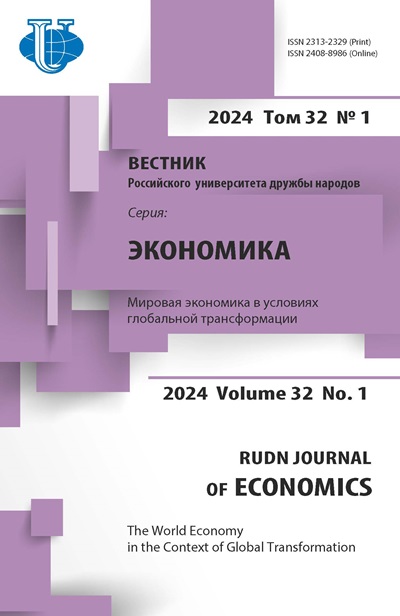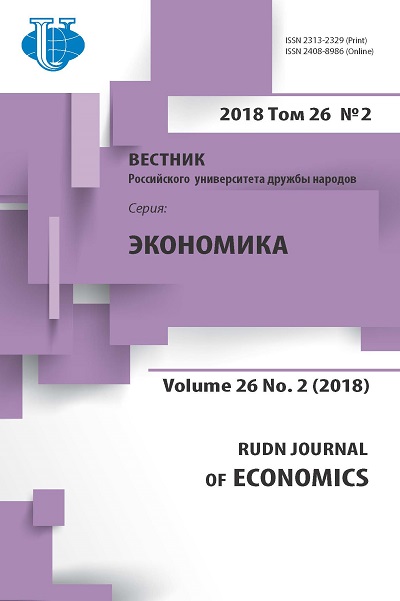ECONOMIC GOVERNANCE IN THE EU: THEORY AND PRACTICE
- Authors: Pliuiko AY.1, Tsibulina AN1
-
Affiliations:
- Moscow state institute of international relations
- Issue: Vol 26, No 2 (2018)
- Pages: 224-234
- Section: GLOBALIZATION AND ECONOMIC INTEGRATION
- URL: https://journals.rudn.ru/economics/article/view/18901
- DOI: https://doi.org/10.22363/2313-2329-2018-26-2-224-234
Cite item
Full Text
Abstract
The article deals with the main economic theories applicable to the system of economic regulation in the regional economic integration associations. It has been proven that in the absence of universal and complex theory of economic governance in the context of integration associations, the EU has used particular provisions of various existing concepts. It has been revealed, that in its practice of supranational regulation of economic activity monetarist ideas are widely applied. Meanwhile economic governance on the state level is based on Keynesian methods. Principles of the theory of fiscal federalism are reflected in the allocation of functions between supranational institutions and member-states in the EU.
About the authors
A Yu Pliuiko
Moscow state institute of international relations
Author for correspondence.
Email: aleksmg@mail.ru
lecturer of the Department of Integration Processes of the European Studies Institute at the Moscow State Institute of International Relations (MGIMO-University).
76, Vernadsky av., Moscow, 119454, Russian FederationA N Tsibulina
Moscow state institute of international relations
Email: annsavin@hotmail.com
PhD in Economics, docent of the Department of Integration Processes of the European Studies Institute at the Moscow State Institute of International Relations (MGIMOUniversity); senior Researcher of the European Union Documentation Center EU-i of the Institute of Europe of the Russian Academy of Sciences
76, Vernadsky av., Moscow, 119454, Russian FederationReferences
- Andronova I.V. Evolyutsiya integratsionnyh protcessov na postsovetskom prostranstve. Vestnik RUDN. Seria Ekonomika. 2012. № 5. S. 72—81. (in Russ).
- Butorina O.V. Ponyatie regionalnoi integratsii: novye podhody. Ksmopolis. 2005. № 3(13). S. 136—145. (in Russ).
- Borko Yu.A. ES: institutsionalnya sistema economicheskoy integratsii. Evropeiskii souz v poiske globalnoi roli: politika, economika i bezopasnost / pod obsh. red. Al.A. Gromyko, M.G. Nosova. М.: Ves Mir, 2015. S. 29—54. (in Russ).
- Evropeiskaya integratsiya / pod red. O.V. Butorinoi, N.Yu. Kaveshnikova. 2-e izd., ispr. i dop. М.: Izd-vo «Aspect-Press», 2016. 736 s. (in Russ).
- Keyns J.M. Obshaya teoriya zanyatosti, protsenta i deneg. Izbrannoe. М.: Эksmo, 2007. 958 s. (in Russ).
- Kouz R. Firma, rynok i pravo. М.: Novoe izdatelstvo, 2007. 224 s. (in Russ).
- Masgrave R.A., Masgrave P.B. Gosudarstvennye finansy: teoriya i praktika. М.: Bizness Atlas, 2009. 716 s. (in Russ).
- Smit A. Issledovanie o prirode i prichinah bogatstva narodov. М.: Эksmo, 2007. 960 s. (in Russ). Fridman M. Kapitalism i svoboda. М.: Novoe izdatelstvo, 2016. 288 s. (in Russ).
- Shishkov Yu.V. Integratsionnye protcessy na poroge XXI veka. Pochemu ne integriruyutsya strany SNG. М.: III tysyacheletie, 2001. 480 s. (in Russ).
- Economic Spillovers, Structural Reforms and Policy Coordination in the Euro Area / Eds. Bas van Aarle, Klaus Weyerstrass. Heidelberg: Physica-Verlag, 2008. 235 p.
- Oates W.E. An Essay on Fiscal Federalism. Journal of Economic Literature. 1999. Vol. 37. No. 3. P. 1120—1149.
- Samuelson P.A. Foundations of Economic Analysis. Cambridge, Mass.: Harvard University Press, 1947. 447 p.
- Treaty on European Union on 7 February 1992. Luxembourg: Office for Official Publications of the European Communities, 1992. 253 p.
- Quantitative Economic policy. Essays in Honour of Andrew Hughes Hallett / Eds. R. Neck, C. Richter, P. Mooslechner. Berlin, Heidelberg: Springer-Verlag, 2008. 377 р.















